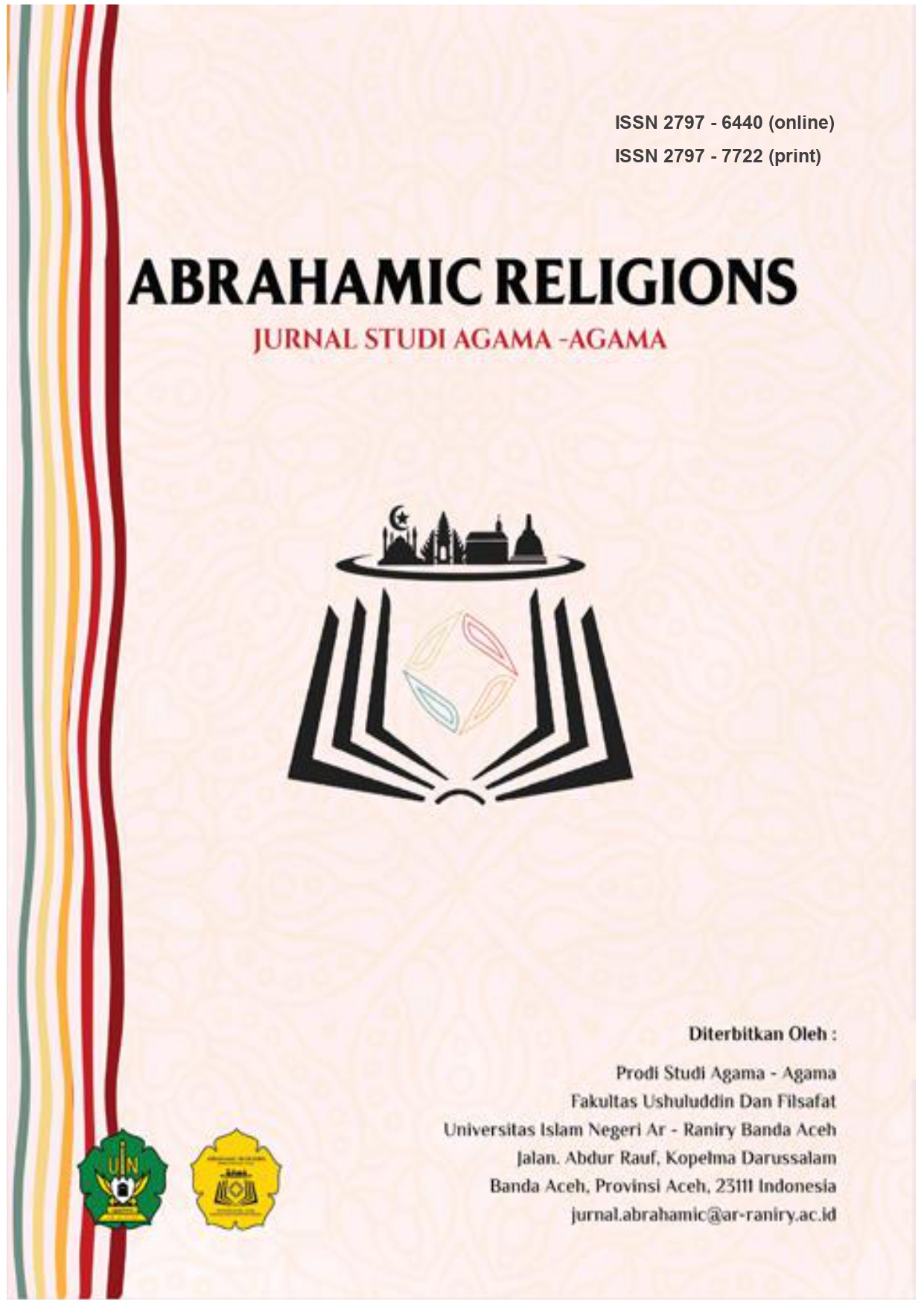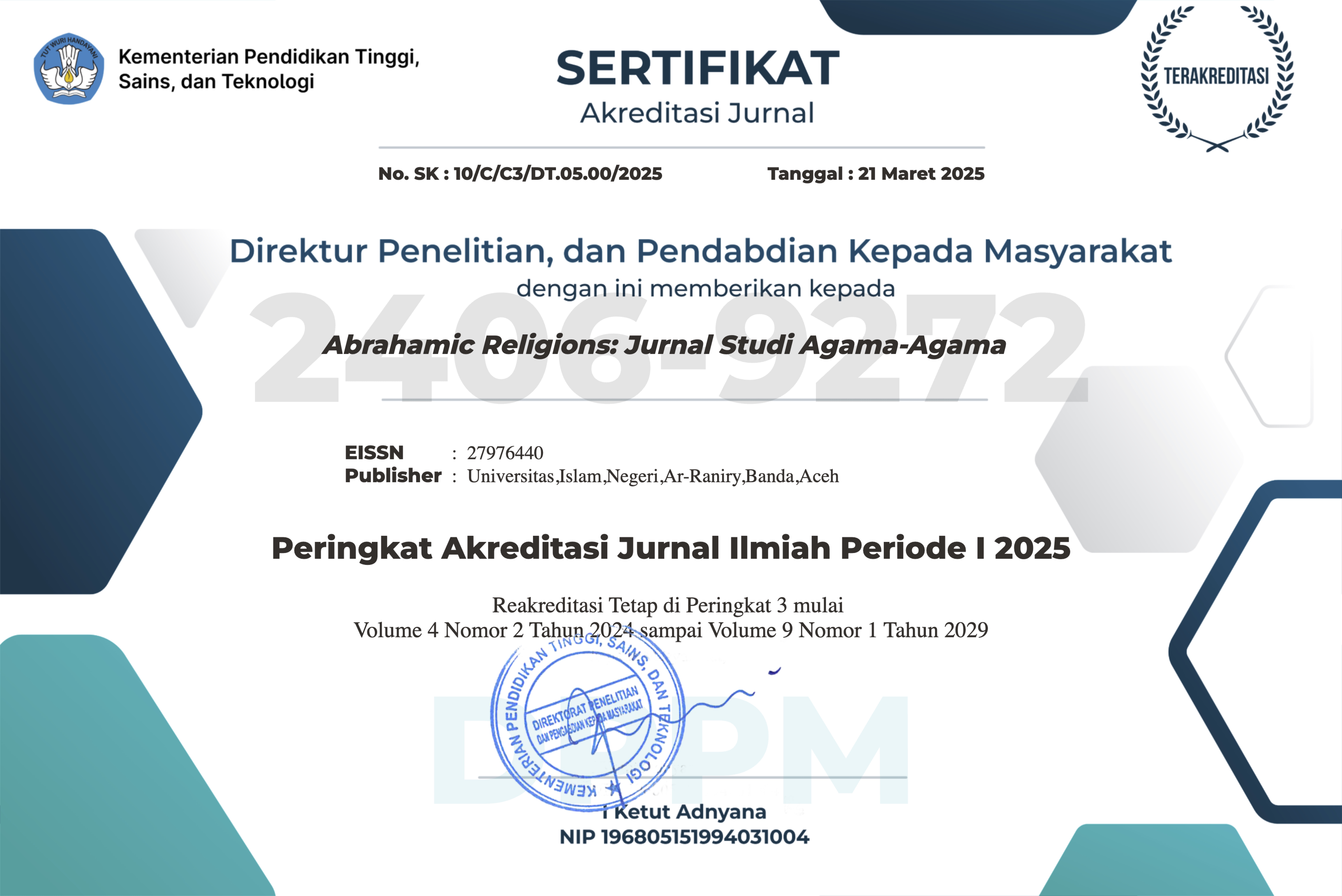EKSISTENSI UMAT BUDHA DI KOTA BLANG PIDIE: TELAAH HUBUNGAN SOSIAL KEAGAMAAN
DOI:
https://doi.org/10.22373/arj.v2i1.12093Keywords:
Eksistensi, Umat, Hubungan SosialAbstract
Aceh is one of the provinces that adhere to various religions. Aceh or commonly dubbed as 'Beumo Seuramo Meukah' is predominantly Muslim, of course Aceh is based on Islamic Shari'a and also has a special Qanun formulated in accordance with Islam itself. The various adherents of religious communities also do not rule out the possibility of conflicts arising from excessive fanaticism so that the emergence of a sense of intolerance in every religious community. The ummah is an inseparable part of religion, the existence of the ummah is the most important thing in religion or also commonly referred to as followers. Religion does not exist without the adherents of that religion, there are those who lead the event, there are those who prepare the place and tools for the ceremony, and at the same time they become participants. The existence of the people is very influential on the religion itself, the achievement of that religion and the social relations that have a big influence on the religion itself. Relations among religious people based on tolerance, mutual understanding, mutual respect, respect for equality in the experience of religious teachings and cooperation in social life, or what is commonly termed 'religious harmony'. The process of this research through descriptive-qualitative, among others, are: observation, interviews and literature review that reads several book references that are related to this research. The results of this study indicate that there are several dimensions of the socio-religious life of Buddhists in Blang Pidie City, including: the religious dimension, the dimension of social interaction and the dimension of attitude, some of these dimensions can cause factors that affect the socio-religious life of the Buddhist community in Blang Pidie City. Social interactions that are not well established can also have an impact on every individual in society in everyday life.
References
Agus Bustanuddin, Agama Dalam Kehidupan Manusia Pengantar Antropologi Agama, PT GRAFINDO PERSADA, Jakarta, 2006
Ahmed Mariamait, Dialektika Dialog Lintas Agama: Pembacaan Wacana Islam Kontenporer, USHULUDDIN PUBLISHING FAKULTAS USHULUDDIN IAIN AR-RANIRY BANDA ACEH 2013
Ali Ahmad Haidlor, Hubungan umat beagama Studi Kasus Penutupan / Perselisihan Rumah Ibadah, Jakarta: Badan Litbang dan Diklat Kmentrian Agama RI, 2012
Arikunto Suharmi, Prosedur Penelitian Suatu Pendekatan Praktik, Jakarta Rineka Cipta, 2010
Bagus Lorens, Kamus Filsafat, Jakarta: Gramedia Pustaka Utama, 2005
Basyumi Muhammad, Kebijakan Dan Strategi Kerukunan Umat Beragama, Jakarta, Badan Litbang Diklat Departema Agama RI, 2006
Ghony M. Djunaidi dan Almanshur Fauzan, Metode Penelitian Kualitatif, Jogjakarta, Ar Ruzz Media, 2017
Liata, N., & Fazal, K. (2021). MULTIKULTURAL PERSPEKTIF SOSIOLOGIS. Abrahamic Religions: Jurnal Studi Agama-Agama, 1(2), 188. https://doi.org/10.22373/arj.v1i2.11213
Mochtarom Zaini, Vredenbregt Jacob, Donze E. Van, Ilmu Perbandingan Agama Di Indonesia (Beberapa Permasalahan) Kumpulan Makalah Seminar, Perpustakaan Nasional: Indonesian Netherlands Cooperation in Islamic Student (INIS) 1990
Narwoko J. Dwi, Suyanto Bangong, Sosiologi Tesk Pengantar dan Terapan, Edisi ketiga, Jakarta; Kencana, 2010
Nurdin Abidin, Studi Agama Konsepsi Islam Terhadap Pelbagai Persoalan Kemanusiaan, Pustaka Larasan, Denpasar Bali, Cetakan Pertama 2014
Ratu Perwiranegara H. Alamsjah, Pembinaan Kehiduan Beragama Di Indonesia, Cetakan Ke 1 (1982) PT. KARYA UNIPRESS Jakarta
Sumatmadja. H. Nursid, Manusia dalam Konteks Sosial, Budaya dalam Lingkungan Hidup, Alfabeta, Bandung, 2012
Tamrin Z H.M, Mulyana Edi, Pantai Barat Aceh Di Panggung Sejarah, Jakarta 26 Maret 2009, Badan Arsip dan Perpustakaan Provinsi Nangro Aceh Darusalam 2009
Downloads
Published
Issue
Section
License
Authors who publish in this Journal agree to the following terms:
- Authors retain copyright and grant the journal right of first publication with the work simultaneously licensed under Attribution-ShareAlike 4.0 International (CC BY-SA 4.0) allows others to share the work with an acknowledgment of the work's authorship and initial publication in this journal.
- Authors are able to enter into separate, additional contractual arrangements for the non-exclusive distribution of the journal's published version of the work (e.g., post it to an institutional repository or publish it in a book), with an acknowledgment of its initial publication in this journal.
- Authors are permitted and encouraged to post their work online (e.g., in institutional repositories or on their website) prior to and during the submission process, as it can lead to productive exchanges, as well as earlier and greater citation of published work. (See The Effect of Open Acces)















